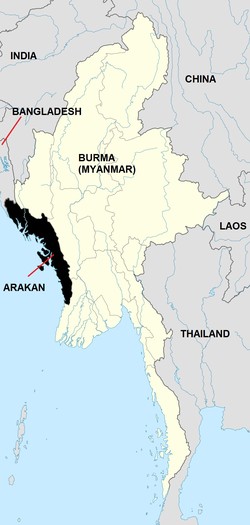 The Rohingya, a Muslim minority group in Buddhist Burma, have faced systematic discrimination by the government and by the communities in which they live. Many have been denied citizenship, and government officials typically refer to them using pejorative terms. The Rohingya are not respected as native Burmese, and instead are thought of by many as Bengali. Doctors without Borders, Amnesty International, Human Rights Watch and the UN Special Rapporteur on the situation of human rights in Myanmar have all reported endemic discrimination against Rohingya.
The Rohingya, a Muslim minority group in Buddhist Burma, have faced systematic discrimination by the government and by the communities in which they live. Many have been denied citizenship, and government officials typically refer to them using pejorative terms. The Rohingya are not respected as native Burmese, and instead are thought of by many as Bengali. Doctors without Borders, Amnesty International, Human Rights Watch and the UN Special Rapporteur on the situation of human rights in Myanmar have all reported endemic discrimination against Rohingya.
In the past six months ethnic tensions in Arakan (where most Burmese Rohingya live) have erupted into open violence. On May 28th, a Buddhist Rakhine woman was raped and murdered. Although the police arrested three (Rohingya, Muslim) suspects, rioting broke out, and, on June 3rd, a Rakhine mob lynched ten Muslims, starting a wave of violent attacks against Rohingya. Hundreds have been killed and nearly 100,000 displaced. Though the immediate violence has died down, few can safely return to their homes.
In a discussion led by the Burma Task Force on Friday at the Church Center for the United Nations, we heard stories of the violence, stories of the arrests and disappearances of men and stories of the deaths of hundreds trying to flee to safety in Bangladesh, where border guards have been ordered to push back all refugees, and where the government has declined $33 million in UN aid for fear of making refugee camps too comfortable. Aid agencies and media are denied access to refugee camps in Bangladesh and, in Burma, to most of Arakan. Given the ongoing violence and persecution since 1962, there is fear that the government’s tacit endorsement of forcible displacement will eliminate the Rohingya from their native home.
U.S. Representatives Trent Franks and Heath Shuler, co-chairs of the International Religious Freedom Caucus, and nineteen other members of Congress sent a letter to President Obama ahead of his trip to Asia this weekend “urging him to underscore current human rights atrocities in Burma.”
Learn about Presbyterian connections to Burma (Myanmar).
Alexander Haines, a student at Princeton Theological Seminary, is serving as a field education intern with the Presbyterian Ministry at the United Nations.